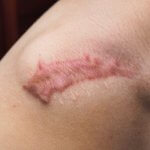It’s Scleroderma Awareness Week. We’re taking part by raising awareness across our social media channels.
Scleroderma is an autoimmune condition which causes hardening of the skin and/or internal organs. This hardening is caused by the excess production of collagen.
There are two main types of scleroderma these; localised scleroderma and systemic sclerosis. Localised scleroderma affects only the skin while systemic sclerosis can affect the skin, blood circulation and internal organs [1].
The symptoms of scleroderma are similar to that of many other autoimmune conditions and as such it can take a long time to get a diagnosis, it is estimated that it could take up to 5 years for a person with scleroderma to receive the correct diagnosis [2].
While scleroderma can affect both sexes and across age groups it is most prevalent in women aged 30-50. Thankfully, scleroderma is particularly rare with just 6,000 people receiving a diagnosis of systemic sclerosis in the UK [3] and 3 in a million children receiving a diagnosis of localised scleroderma [4].
Current treatments for scleroderma are symptomatic, meaning that there are no treatments currently available to treat the causes of scleroderma. What causes the onset of scleroderma is not yet fully understood which may be why therapies to treat the causes of scleroderma have been difficult to find. However, there has been some success in treating scleroderma with stem cells, particularly autologous stem cells. Autologous stem cells are stem cells which come from the patient’s own body.
Over the course of the week we will look at the causes, symptoms and risk factors of scleroderma in more detail. Later in the week we will also look at the role stem cells are playing in the search for a treatment of scleroderma and look at the work of Dr. Richard Burt of Northwestern University who is a leading figure in the development of stem cell therapies for autoimmune diseases.
[1] http://www.nhs.uk/conditions/scleroderma/Pages/Introduction.aspx
[2] https://www.youtube.com/watch?v=Gl66qO8uxSM
[3] http://www.patient.co.uk/health/scleroderma-systemic-sclerosis
[4] http://www.patient.co.uk/health/localised-scleroderma-morphoea









